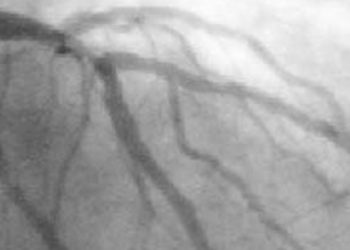Machine learning-based PRAISE score may aid in the prediction of adverse events following an acute coronary syndrome
1. The PRAISE score showed accurate discriminative capabilities for the prediction of all-cause death, acute myocardial infarction, and major bleeding after an acute coronary syndrome.
2. Compared with low risk stratification, a high-risk PRAISE score was associated with a 58.8-times increase in death, 27.7-times increase in myocardial infarction, and a 32.7-times increase in major bleeding events.
Evidence Rating Level: 2 (Good)
Study Rundown: Patients with acute coronary syndrome (ACS) are at an increased risk for ischemic and bleeding events. Although several predictive tools have been developed to predict adverse events, the accuracy of these scores remains modest. It is believed that machine learning may overcome some of the limitations of current analytical approaches. This study aimed to develop and validate a machine learning-based risk stratification model to predict all-cause death, recurrent acute myocardial infarction, and major bleeding after ACS. Four machine learning models were developed to predict the occurrence of each of the three outcomes one year after discharge. According to study results, the PRAISE score showed accurate discriminative abilities for the prediction of all three outcomes, even when externally validated. Specifically, the risk of myocardial infarction was greater than the risk of major bleeding among patients classified by the PRAISE score as being high risk for myocardial infarction. In contrast, the risk of myocardial infarction was lower than the risk of major bleeding among patients classified as being low risk for infarction. This study was limited by the retrospective design of the registries used to compose the derivation cohort. Perhaps, a prospective design could have been chosen to increase the validity of the PRAISE model. Overall, this study showed that a machine learning-based approach may accurately predict the occurrence of adverse events and aid in optimizing care for patients following an ACS.
Click to read the study in The Lancet
Relevant Reading: Artificial Intelligence to Detect Papilledema from Ocular Fundus Photographs
In-depth [prospective cohort]: Patients for the derivation cohort were obtained from two registries: the BleeMACS registry (comprising 15 401 patients with ACS at 15 tertiary hospitals in America, Europe, and Asia), and the RENAMI registry (comprising 4425 patients admitted at 12 European hospitals). Altogether, the derivation cohort consisted of 19 826 patients (≥18 years) with ACS and 1 year follow-up data. The derivation cohort was split into two groups: a training cohort (80%) and an internal validation cohort (20%). To assess the performance of the PRAISE score, an external validation cohort of 3444 adult patients admitted to the hospital with ACS with 2 years of follow-up was used.
Area under the receiver operating characteristic curves (AUCs) of the PRAISE model (training and internal validation cohort) for all three outcomes were similar to the external validation cohort. In the internal validation cohort, AUCs for 1-year all-cause death, 1-year myocardial infarction, and 1-year major bleeding were 0.82 (95% confidence interval [CI], 0.78-0.85), 0.74 (95% CI, 0.70-0.78), and 0.70 (95% CI, 0.66-0.75), respectively. For the external validation cohort, AUCs for 1-year all-cause death, 1-year myocardial infarction, and 1-year major bleeding were 0.92 (95% CI, 0.90-0.93), 0.81 (95% CI, 0.76-0.85), and 0.86 (95% CI, 0.82-0.89), respectively. Compared to the low-risk group, being in the high-risk group increased the risk of death by 58.8 times, myocardial infarction by 27.7 times, and major bleeding events by 32.7 times. While predictors varied based on study outcomes, left ventricular ejection fraction (LVEF), age, hemoglobin level, and statin therapy were important predictors for 1-year all-cause death. Meanwhile, hemoglobin level, age, LVEF, and estimated glomerular filtration rate (EGFR) were important predictors of both 1-year myocardial infarction and major bleeding risk. Findings from this study show that a machine learning-based approach for the identification of predictors of events after an ACS is effective and may help guide clinical decision making.
Image: PD
©2021 2 Minute Medicine, Inc. All rights reserved. No works may be reproduced without expressed written consent from 2 Minute Medicine, Inc. Inquire about licensing here. No article should be construed as medical advice and is not intended as such by the authors or by 2 Minute Medicine, Inc.







